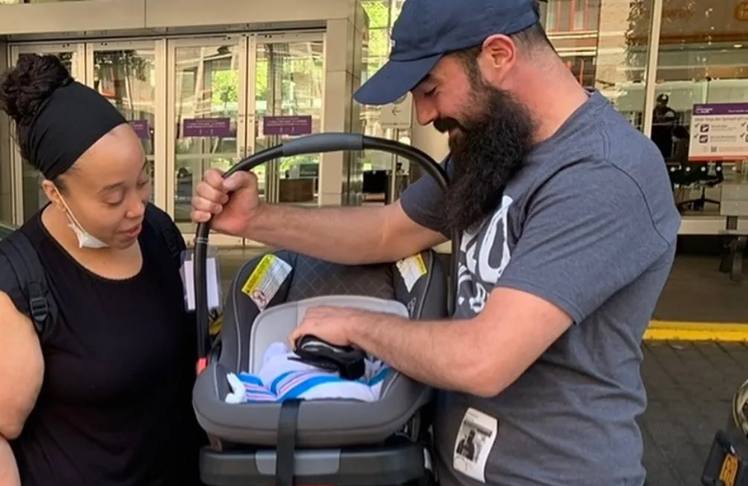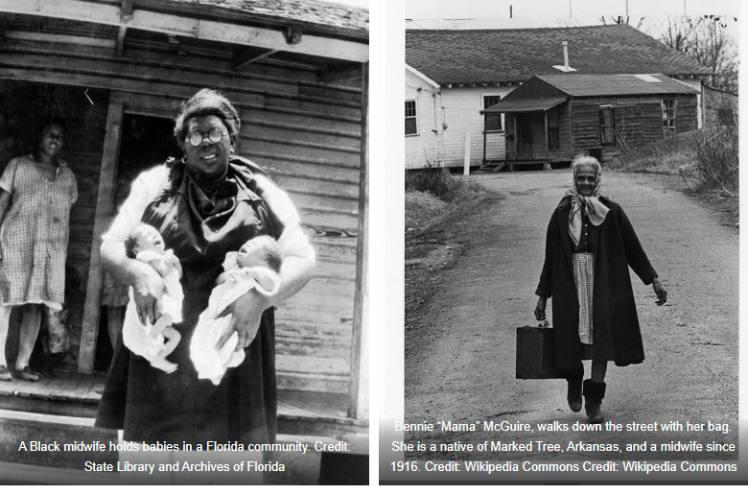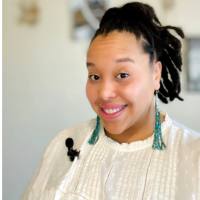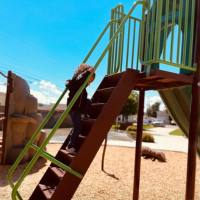
Giving birth wasn’t always a medicalized event with unnecessary interventions and fatal or near-death experiences in hospitals. Some 70-odd years ago, Black mothers were nursed at the bedside by well-respected Black midwives.
The caretakers supported their community’s moms through all stages of childbirth — pregnancy, delivery, and postpartum. In a time when EMS and cell phones didn’t exist, some traveled on foot to homes when they “felt” it was time.
But they arrived. Carrying totes packed with tools and minds with a wealth of knowledge pre-dating American chattel slavery.
That system of mother-centered, communal care was destroyed in the mid-1900s when regulations were imposed on the profession. The Grand Midwives, as they’re called, were forced to undergo licensing or leave the work altogether.
Maternal care for Black women hasn’t been the same since. But Black moms are fighting to get back what was lost.

Kimberly Reyes, a 40-year-old mother of one and a trained historian, planned for a midwife-supported homebirth for her first child but wasn’t able to get that. She was forced into emergency hospital care after her water broke at 23 weeks.
After being born, her daughter stayed in the NICU for 109 days, which Reyes calls “hypermedicalized” care, where she could not hold her baby for weeks or share moments with her husband due to COVID-19 regulations.
And at times, her concerns and “motherly instincts” were dismissed.
“There was this constant and kind of difficult battle of having your own wishes for your child: when they would sleep and when they would eat, who would hold them,” she tells Word In Black about her spring 2020 birth.
That same year, the Minnesota resident founded “All The Unexpected,” a podcast and documentary film company that seeks to empower mothers through topics such as global birth practices and conscious parenting.
Word In Black sat down with Reyes to learn more about how she navigated her hospital birth experience, the history of Black women’s medical exploitation, and how Black women can protect their motherhood.
WIB: I was once told by a midwife that “birth isn’t a medical event.” She said it’s a physiologic one that carries sentimental significance for mothers and families. We know that hospitals don’t always honor this perspective. How did you navigate “owning” the emotional aspects of your birth in a medicalized environment?
KIMBERLY REYES: There were a number of times when wishes that we had expressed were ignored. I’ll give you an example. There’s a tradition in a lot of families — mine included — that you save a piece of the baby’s umbilical cord, and it goes in a little wax paper, and it goes in the baby book.
Mine is still, 40 years later, set in a book. It was one of those things that we did. And so I left a note with every shift change: When the cord falls off, please save it and put it aside.
I came one morning — it wasn’t even me changing her diaper because I wasn’t allowed to do that for the first month-and-a-half — and a nurse was doing the care. And I noticed it was gone.
I said, “OK, well where is it?” It had just been thrown out. Instead of anybody apologizing, the nurse just looks at me and goes, “Oh, well, you know, things happen,” and walks away.
WIB: What was it like trying to care for your baby’s health while she was in the NICU? I understand that you weren’t able to touch her for a while.
KR: When preemies are first born, they don’t necessarily hold their body heat very well, and you have to put them on and off warmers. As you start to wean them off, sometimes they’ll have setbacks, and they’ll get too cold, and you have to put them back into the warming bed.
I walked in, and I looked at my daughter, and I knew from her being slightly lethargic and just the way her lips looked — I just knew what she looked like when she was cold. I said to the nurse, “She’s cold.” And she said, “Oh, we just took the temperature not too long ago. It’s due in another hour.”
I said, “No, you need to take her temperature now, because I’m pretty sure she’s below what she needs to be, and she should go back on the warmer.” And she was kind of exasperated with this look of, “Oh, these parents think they know everything.”
And lo and behold — I guess more just to appease me than actually to just do what needed to be done — she took her temperature, and we were at 96.2. And she said, “Oh wow, she does need to go to the warmer.”
I said, “I know because this is my child, and I am her mother. I made her, and I grew her and took every precaution humanly possible to keep her safe. And I know this person.”

WIB: As a historian, what can you share about the connection between historic harms done to Black women and the present-day struggle for reproductive justice?
KR: There’s a twofold aspect to it, and one of them does date back to the history of Western medicine and the history of modern medicine as we know it in this country, being deeply rooted in racism and deeply rooted in a science of physiological difference between Black people and white people.
You can go back and read pages in the New England Journal of Medicine from 1840 that talks about the actual nerve endings being different in the African body. And because of this difference, pain is felt less, right? And so this justification that pain is felt less leads to the corporal punishment of slaves. They don’t feel it if you’re whipping them, right? So, it’s a reasonable thing to do, or they don’t feel it as severely.
That translated to women and the belief that they literally experienced childbirth differently — they didn’t feel the same pain. And that perception led to the likes of Jay Marion Sims and other doctors being credited with birthing the field of gynecology to experiment on slave women for many years without anesthetics.
You had situations where, even up until the year 2016, studies were done, and there were medical students and practicing residents who sat there with a set of beliefs that Black and white people actually felt pain differently. And not only did they believe these things, but it actually influenced the way in which they practiced medicine and how they treated patients.
So, you’ve got that piece of the puzzle. The other piece of the puzzle was the eradication of the midwife. The removal of a person who had in the past cared for Black women, not only throughout their entire pregnancy, but through their postpartum experience as well — which is where so much maternal loss actually does occur.
You have that situation coupled with people who are literally treating patients differently because they have these false beliefs about pain, about all of the other cultural precepts. It creates a perfect storm of the current maternal mortality crisis that we are experiencing.
WIB: It’s clear that the medical system is just beginning to shift its care culture. While it changes, which could take time, how do you suggest mothers protect themselves?
KR: If you can remove yourself from the hospital, great. Do that. That’s going to be step one to take care of yourself. But let’s be real, right? In today’s age, we’re struggling to put food on the table. The average American is, regardless of color. Let’s talk about the fact that most people don’t have that choice.
Because of state laws, because of all these different barriers put into place for people not to be able to birth in the way they want to, you have to go to the hospital. So, if you have to go to the hospital, what does it look like to take back your power in that situation?
One of the quintessential pieces of that is to have a birth plan in place. And not just something that you communicate verbally, but something that you communicate in writing. You can take that entire plan, have it written down, and have it notarized, so that it is a legally recognized document.
And I’ll tell you, hospitals do not like lawyers. Hospitals do not like litigation.

WIB: What do you want folks to know about “All The Unexpected”? And where can they find you?
KR: AllTheUnexpected.com is where you can find our web destination, which has a podcast. We have resources for families well past birth.
A lot of the things we talk about these days have to do with breaking cycles of trauma, parenting consciously, and making choices for toddlers and children as they grow older in terms of behavior, education, eating, diet, and all of those things.
We can also be found on all of the socials: Facebook, Instagram, Pinterest, Twitter, and YouTube. It’s just “All The Unexpected” everywhere.















